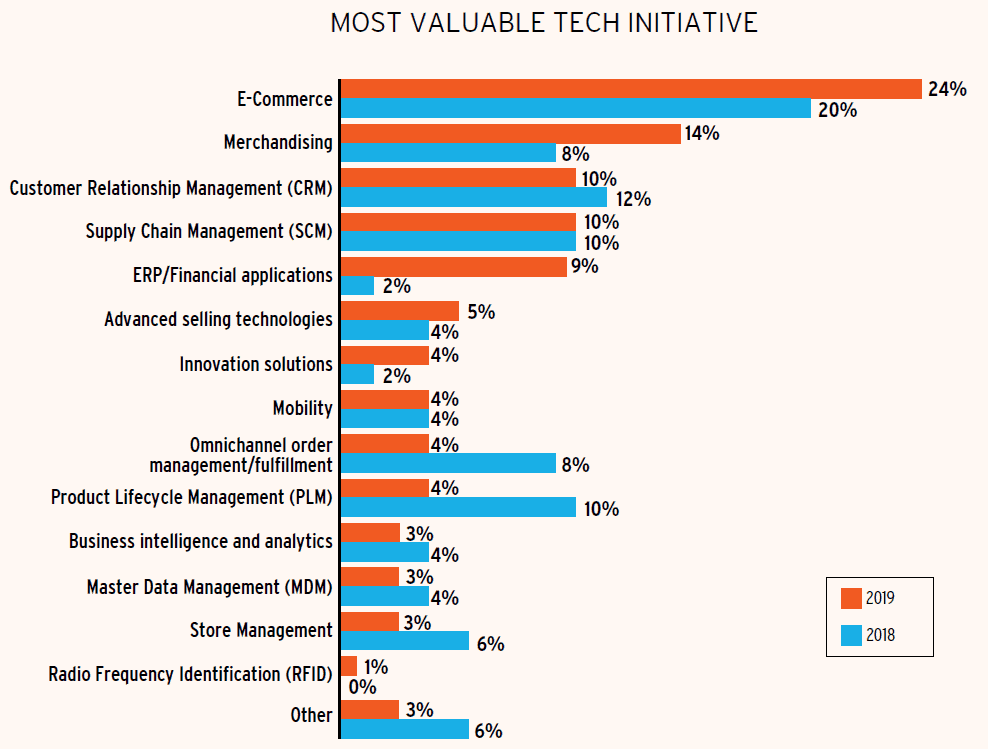In my last RFID article titled “Keeping Physical Retail In-Stock” in 2018, I concluded that the two most relevant components of positive customer experiences in physical stores are fast checkouts and products being in-stock. Multiple recent retailer quarterly earnings calls, several articles, and two requests from China on direct consulting with potential investors in RFID inspired this updated technology review.

In the latest Nike earnings call, CEO Mike Parker directly stated that RFID “is improving product visibility and is an important step toward integrating our diverse ecosystem of physical and digital experiences, distribution centers and contract factories.” Calvin McDonald, CEO of Lululemon in his earnings call cited the company’s strength and unique position in being able “to activate great product across our omni-guest experiences, leveraging our stores, community and events.” Both Nike and Lululemon reported strong financial results for their respective quarters.
From what I have personally seen in working with major global retailers deploying RFID, this Internet-of-Things (IoT) technology continues to have digital transformation possibilities.
It’s 2019. Are We There Yet RFID?
As was the case last year, the data is mixed on the retail progress of RFID. In the 2018 RIS Store Experience Study, the technology was last on a list for growth in spending in emerging technologies at 1.3 percent. In the 2019 edition of the same study, RFID is still listed as an emerging technology, but the percentage is much higher.

Interestingly for the 2019 edition, RFID is being bundled with smart shelves and computer vision as alternative inventory visibility solutions. Note the adoption trends of the various digital transformation technologies in retail stores.

Note also the growing percentage of retailers looking to robotics for inventory management.
Most Valuable Apparel Technologies
Apparel has been the sweet spot for the adoption of RFID for some time. The latest Apparel Magazine Technology Outlook again points to mixed priority focus on the technology. In this survey only 1% rated RFID as a most valuable technology for 2019.

RFID adoption trends are higher in the apparel segment of the retail industry as reflected in the same publication.

Within the apparel segment, the applications of RFID are interesting and growing.

“When it comes to plans for deployment in RFID in 2019, each area of application made some strides in 2019 vs. 2018. For example, plans to deploy RFID at point of sale are up from 2% to 4% this year; plans to deploy for logistics and transportation are up to 7% from 2% last year; in the warehouse, up to 9% from 4% last year; and in loss prevention, up to 9% from 4% last year.”
Apparel Retail Growth Continues
For this article, IDTechEx was kind enough to share the latest RFID label shipments data. Note the aggressive Compounded Annual Growth Rate (CAGR) that continues in the apparel industry for RFID.

In other publications IDTechEx also projects positive growth for RFID through 2022.

RFID adoption in apparel will continue to grow and above future forecasts are possible, but success will require less fixation on the technology itself.
The Adoption Outlook of Retail RFID
“It’s quickly becoming the most precise tool in our arsenal to meet an individual consumer specific need at the exact right moment…I think this will help us create the capability to grow profitably across the breadth of the portfolio and ultimately, again it’s putting ourselves in position to serve consumers in a way that gets them the product that they need when they want it and where they want it.” – Mark Parker, Nike CEO
Nike being the latest major brand implementing RFID is a positive harbinger for the future of this technology. As above statement implies, critical is the focus on the differentiation being delivered or the problem being solved. It is never about the technology itself.
Omni-channel inventory visibility and immersive consumer experiences are extremely critical today for a connected consumer that can instantly choose alternatives. Simply summarized, being out-of-stock means handing over your business, perhaps on a permanent basis, to your physical store or online competitor.



